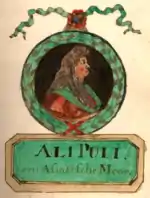Ali Puli
Ali Puli, also known as Alipili, is the attributed author of a number of 17th-century alchemical and hermetic texts. However, his historical existence is doubtful, and A.E. Waite went as far as to describe the work attributed to him as "forgery pure and simple in respect of age and authorship [which] may be left to stand at its value in the matter of content."[1]
Ali Puli | |
|---|---|
 18th Century depiction of Ali Puli by Burghard de Groot | |
| Died | Not Specified |
| Nationality | Mauretanian |
| Occupation | Alchemist |
| Known for | Hermetic Philosopher and attributed author of Centrum Naturae Concentratum |
He is described as a Mauretanian Christian of Asiatic extraction - also variously as an Arab (because he was said to have written in Arabic), and a Moor.[2]
Most probably, Ali Puli is the pseudonym of Johann Otto von Helwig (1654-1698), a German physician, alchemist and author.[3]
Influence
The most influential work attributed to him is Centrum Naturae Concentratum. This work was purported to have been written originally in Arabic, though no Arabic version is extant. It was first published in German in 1682 by Johann Otto von Helwig.[4] In 1694 a Dutch translation was published. It was first translated into English by Edmund Brice in 1696. It is most noted for the following passage:
I admonish thee, whosoever thou art, that desirest to dive into the innermost parts of Nature, if that thou seekest thou findeth not within thee, thou wilt never find it without thee.[5]
This passage is cited by Waite as evidence of a spiritual mystical tradition within alchemy, and has been widely quoted, notably by the theosophist Madame Blavatsky (who misattributes him as Abipili).[6]
The passage has been identified as a source of the Wiccan Charge of the Goddess produced by Gerald Gardner and later revised by Doreen Valiente.[7] It is the oldest of the sources so identified.
References
- Waite, A.E. (1926). The Secret Tradition in Alchemy, its development and records. London: K. Paul, Trench, Trubner & Co., Ltd. pp. 352–7. OCLC 1295967.
- Waite, A.E. (November 1914). "Some notes on the alchemist Alipili". The Alchemical Journal. 3 (15): 25–28. OCLC 41963988.
- Jürgen Strein: Wissenstransfer und Populärkultur der Frühaufklärung: Leben und Werk des Arztschriftstellers Christoph von Hellwig (1663–1721), Walter de Gruyter, Berlin 2017, p. 43
- Centrum naturae concentratum, oder, Ein Tractat von dem wiedergebohrnen Saltz: insgemein und eigendlich genandt der Weisen Stein, in Arabischen geschrieben von Ali Puli, einem asiatischen Mohren, darnach in Portugiesische Sprache durch H. L. V. A. H. und ins Hochteutsche versetzt und heraus gegeben von Johann Otto Helbig Rittern, Churfürstl. Pfälzischen Rath, Leib-Medico, und bey der Heidelbergischen Universität Professore Publico. (Heidelberg, 1682).
- Alipili (1696). Centrum naturae concentratum,or, The salt of nature regenerated. Translated by E. Brice. London: J.Harris. OCLC 13046722.
- Blavatsky, H.P. (1972) [1877]. Isis Unveiled. Vol.2. New York NY: Theosophical University Press Online Edition. p. 617. ISBN 1-55700-135-9. OCLC 310905077.
- Serith, Ceisiwr. "The Sources of the Charge of the Goddess". Archived from the original on 28 September 2007. Retrieved 23 October 2007.
Further reading
Works by or about Ali Puli in libraries (WorldCat catalog)